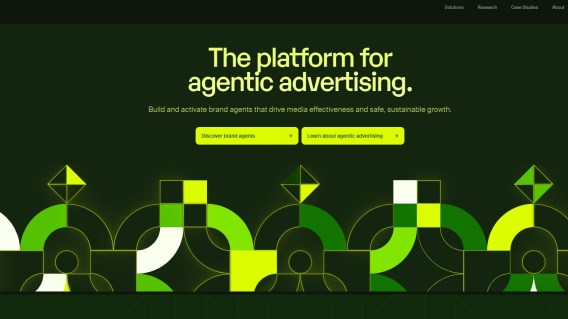
Sustainability takes a backseat as Scope3 plugs agentic AI

Scope3's webpage now promotes it as "the platform for agentic advertising"
Scope3, an ad tech firm launched to clean up digital advertising’s carbon footprint, is leaning further into agentic AI, signalling a pivot from its original sustainability mission.
The US-based firm has cemented its move into artificial intelligence-based technology — known for its carbon-intensive output — by joining a new framework that enables AI agents to exchange data with advertising platforms.
The move builds on the launch of Scope3’s platform earlier this year, designed to help advertisers, publishers and tech partners build and sell agentic media products.
Scope3’s website, meanwhile, now clearly labels itself as “the platform for agentic advertising”, without mention of sustainability in the headline.
Agentic AI refers to artificial intelligence that can autonomously plan and execute complex tasks, rather than simply responding to user prompts.
The technology is based on large language models (LLMs) and demands enormous computing power and data centre capacity, fuelling debate over its growing environmental footprint.
However, Scope3 has now joined forces with the likes of Yahoo and PubMatic to launch what it terms the Ad Context Protocol (AdCP), which is described as a “common language for AI agents across the advertising ecosystem.”
Enjoying Mumbrella? Sign up for our free daily newsletter.
According to the company, “whether an agent is helping a marketer build audiences, discover inventory, or execute media buys, AdCP ensures it can communicate with any compatible platform or agent.”

June Cheung, Brian O’Kelley
Scope3’s pivot into agentic AI technology appears at odds with the company’s founding ethos championed by Brian O’Kelley — the ad-tech “godfather” behind AppNexus, which is now part of Microsoft’s Xandr — to make programmatic advertising more sustainable.
Speaking to Unmade in September 2023, O’Kelley spoke openly about the high impact that digital advertising has on emissions output, thanks to the energy needs of server farms, along with the wastage created by unviewed ads.
“This illusion that the cloud is this fluffy place in the air is actually not accurate,” he said at the time. “The cloud is a bunch of big warehouses full of servers that use a huge amount of energy and cooling power.”
June Cheung, Scope3’s head of Asia Pacific, was approached for comment regarding the company’s change in focus, but was unavailable before the time of publication.
However, in a July opinion piece for Mumbrella, Cheung indirectly addressed sustainability, framing AI agent technology as a means to improve efficiency and reduce wastage across media buying.



I had a meeting with Scope3 a few months ago where they presented this, and I called them out on exactly the same thing. How can you possibly square the circle that is sustainability in a era of AI.
Even if (and it’s a BIG IF) you can buy programmatically more efficiently (thus reducing carbon emissions), you’re simply moving the problem elsewhere, namely, the (energy) cost of the compute.
This is not just a Scope3 issue though.
The speed at which the HoldCos have left sustainability in their rear view mirror in the wake of pouring millions (or billions collectively) into AI shows you that they never really cared in the first place.
Sustainability was simply a means to an end. A direction to take if it meant winning another piece of business. Add this to the list that already includes DEI, flexible working and so on.
These people could not care less.